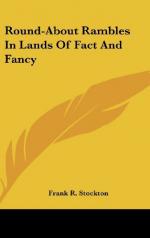“You might have known that no real person would be wandering about the castle at night, and a ghost couldn’t carry anything, for his fingers are all smoke.”
“You ought to have known that too, I should say, Mr. Hubert,” answered Hulda.
“And then, I don’t believe the light was in the castle at all. It was just bobbing about between us and the castle, and we thought it was inside. You ought to have thought of that, Hulda.”
“Me!” exclaimed little Hulda, her eyes almost as big as two silver dollars.
It always seems to me a great pity that there should be such boys as Hubert Flamry.
THE OAK TREE.
[Illustration]
I really don’t know which liked the great oak best, Harry or his grandfather. Harry was a sturdy little fellow, seven years old, and could play ball, and fly kites, and all such things, when he had anybody to play with. But his father’s house was a long distance from the village, and so he did not often have playmates, and it is poor sport to play marbles or ball by one’s self. He did sometimes roll his hoop or fly his kite when alone, but he would soon get tired, and then, if it was a clear day, he would most likely say:
“Grandpa, don’t you want to go to the big oak?”
And Grandpa would answer:
“Of course, child, we will go. I am always glad to give you that pleasure.”
This he said, but everybody knew he liked to go for his own pleasure too. So Harry would bring Grandpa his cane and hat, and away they would go down the crooked path through the field. When they got to the draw-bars, Harry took them down for his Grandpa to pass through, and then put them carefully up again, so that the cows should not get out of the pasture. And, when this was done, there they were at the oak-tree.
This was a very large tree, indeed, and its branches extended over the road quite to the opposite side. Right at the foot of the tree was a clear, cold spring, from which a little brook trickled, and lost itself in the grass. A dipper was fastened to a projecting root above the spring, that thirsty travellers might drink. The road by the side of which the oak stood was a very public one, for it led to a city twenty miles away. So a great many persons passed the tree, and stopped at the spring to drink. And that was the reason why little Harry and his Grandpa were so fond of going there. It was really quite a lively place. Carriages would bowl along, all glittering with plate and glass, and with drivers in livery; market wagons would rattle by with geese squawking, ducks quacking, and pigs squealing; horsemen would gallop past on splendid horses; hay wagons would creak slowly by, drawn by great oxen; and, best of all, the stage would dash furiously up, with the horses in a swinging trot, and the driver cracking his whip, and the bright red stage swaying from side to side.




